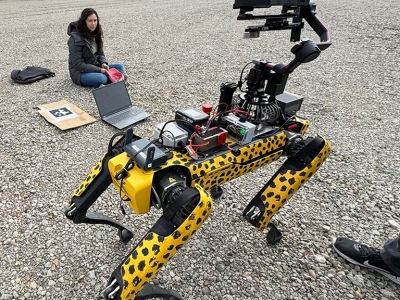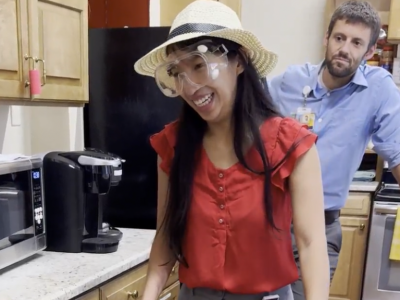News & Publications

RxPLORE Summer Camp Helps Teens Learn About the Pharmacy Profession
By: Megumi Barclay and Isabel Doshi
Mixing benzoyl peroxide and polyethylene glycol in a heated beaker might not sound like your typical high school summer camp activity. While it is a way of making lip balm, for Najih, a rising high school junior from Pittsburgh who attended Pitt’s RxPLORE camp in July, this activity served a greater purpose.

Pitt Study Shows Socioeconomic Factors Can Put Black and Hispanic Preeclampsia Patients at Greater Cardiovascular Risk
Patients with preeclampsia, a high blood pressure disorder that can occur during pregnancy or postpartum, can minimize the health risk by seeking regular follow-up care after delivery.
Malamo E. Countouris, assistant professor of medicine, University of Pittsburgh School of Medicine, is the lead author of a recently published national study on the postpartum care of...

Two New Studies Show How Immunotherapies Collaborate to Boost T Cell Responses in Melanoma
Two studies published in the latest issue of the journal Cell by University of Pittsburgh researchers uncover how immunotherapies targeting the immune checkpoints PD1 and LAG3 work together to activate immune responses. The findings shed light on why combination therapies targeting both checkpoints can improve outcomes for melanoma patients compared to monotherapies targeting only PD1....
Pitt Med Student Wins Young Investigator Award
Ashti Shah, a fourth-year medical student at the University of Pittsburgh, received the Foundation of Systems Biology in Engineering (FOSBE) Young Investigator Award for her research in computation immunology. This is the first year that FOSBE and the literary publication Frontier have cosponsored the award, which is given to new researchers who make substantial contributions to...

Pitt and CMU Researchers Compete in $7 Million DARPA Triage Challenge
A team of University of Pittsburgh and Carnegie Mellon University researchers is working with robotics and artificial intelligence to develop breakthroughs to save lives in mass casualty events by directing medical personnel to people most in need of treatment.
The team, including Leonard Weiss, associate professor of emergency medicine, School of Medicine, is developing...

Pitt named Maternal Health Research Center of excellence

ASCI Selects Pitt to Host the Journal JCI Insight for the Next Five Years
PITTSBURGH, August 7 -- A team of physician-scientists at the University of Pittsburgh will serve as the editorial board of the research journal JCI Insight for the next five years, under the leadership of Oliver Eickelberg, Dorothy P. and Richard P. Simmons Professor of Pulmonary Research and executive vice chair for academic affairs, Department of Medicine.
He brings 20...

Pitt’s Healthy Home Laboratory and Vaccine Hub Team Up for a Unique Learning Experience
By Megumi Barclay and Isabel Doshi
Wearing safety goggles covered in Vaseline, Svea Cheng navigated a walker through a cramped kitchen, simulating the experience of an older patient with glaucoma recovering from surgery. Her tasks included making a peanut butter and jelly sandwich, walking downstairs to feed her cat, and going outside to water her plants.
Cheng, a...

New Brain Cell Atlas Offers Precision Medicine Framework for Traumatic Brain Injury Treatment
A multidisciplinary group of investigators with the University of Pittsburgh and Barrow Neurological Institute in Phoenix created an interactive molecular atlas of traumatic brain injury (TBI) in mice. Their research, which may help doctors use precision medicine to target treatments for TBI patients in the future, was published in Neuron.

New Pitt Research Reveals How People at Risk for Suicide Explore Alternative Solutions
A new JAMA Psychiatry study published by University of Pittsburgh School of Medicine researchers describes patterns of decision-making in people who attempt suicide, focusing on how they explore alternative options. The study is a step toward developing tools for mental health professionals to tailor interventions to patients’ decision patterns.
“People appear to follow...






